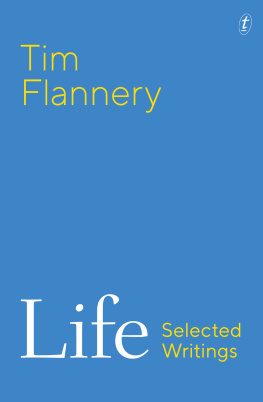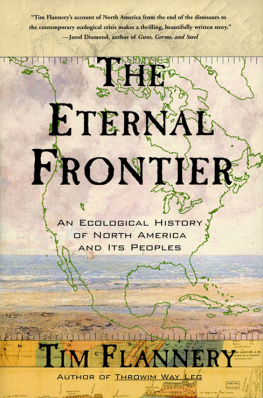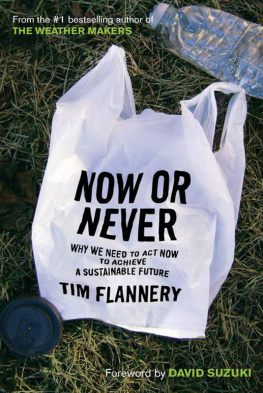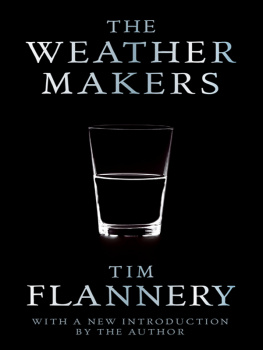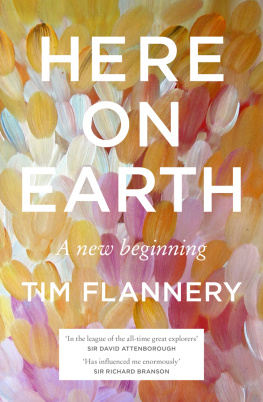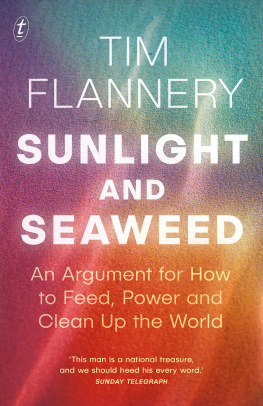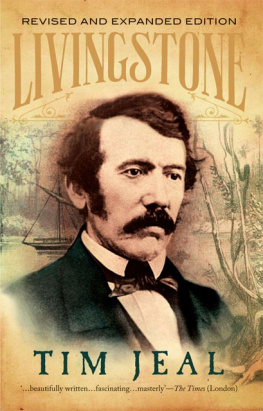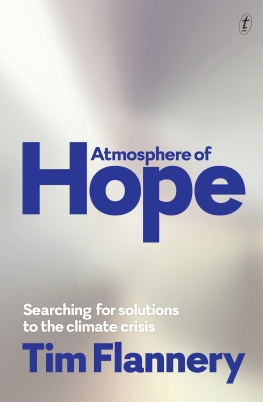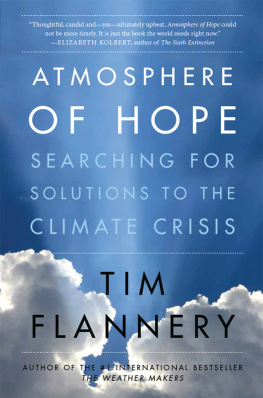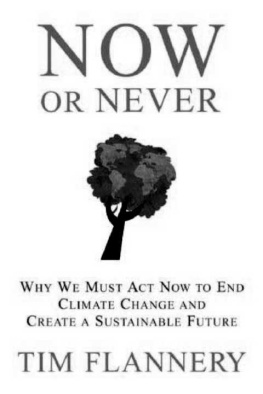

ABOUT THE BOOK
Tim Flannery is one of the worlds great thinkers, environmental scientists and writers. Sir David Attenborough once described him as being in the league of the all-time great explorers like Dr David Livingstone.
This definitive collection of his work brings together thirty years of essays, speeches and occasional writing on palaeontology, mammology, environmental science and history, including the science of climate change and the challenges and opportunities we face in addressing this issue, so critical for all of us.
Life
CONTENTS
2019
THE SELECTED WRITINGS that comprise this volume result from thirty-five years of puzzling at the nature of life. My curiosity has led me to give up a tenured position as a curator in a museum and to take on seemingly inadvisable challenges. Some would call me foolhardy, while others might think me a risktaker. But it seems to me that Im neither: rather my inextinguishable curiosity, coupled with a drive to take on big thingssometimes truly hard thingshas seen me live a varied and exciting life.
Looking back I realise how fortunate I am to have been born in Australia in the mid-twentieth century. Fortunate not just for the political stability and prosperity, but because of the opportunities for adventure. I was born in Melbourne in 1956, in a city not yet 120 years old. Although I arrived twenty years too late to see the last thylacine, which died in Beaumaris Zoo in Hobart in 1936, I was early enough to discover Victorias astonishing dinosaur deposits, which had remained unexplored until I located them in the 1980s. That work was very rewarding. Imagine uncovering the bones of creatures that nobody even imagined existed. One of the dinosaurs, a relative of Tyrannosaurus, whose bones were found in the deposits, even bears my name: Timimus.
The European settlement of my part of the world is so recent that as late as the 1980s there were still frontiers in Australasia separating places where Western government prevailed from regions where tribal cultures laid down the law. I have been fortunate to cross those frontiers and to live with the people of the other side. I count their companionship as the greatest gift I ever received, for it revealed to me another way of living. In many ways it is a good way of living, allowing people to benefit from strong social bonds, children to grow up with a village full of parents, and all to be involved in the politics of village life.
Australasia has changed very fast over my lifetime. When I speak with young Melanesians about my experiences on the other side of the frontier, I can feel like Rip Van Winkle. They all own mobile phones, and tell me I speak old mans pidgin English. Their eyes widen in astonishment as I describe what things were like for their grandparents generation.
Those people I lived with in the heart of the jungle, with little more than a stone or metal axe to forge a living, showed me the essence of humanity, for they took me into their clan and shared with me the most precious knowledge and resources. Living with them, under their guidance, I matured from adolescence to adulthood. It was an experience that shaped the rest of my life.
My early life in my own society, in contrast, offered few opportunities for mentorship and guidance. My father left our family when I was fourteen (he had his own problems), and I attended a Catholic boys school, which I rebelled against. Dr Tom Rich, the vertebrate palaeontologist at the Museum of Victoria, was the only mentor I had in youth, and to him I owe a huge debt in shaping my career as a scientist. But it was only when I went to Papua New Guinea that I found men who skilfully, often in ways I was unaware of, mentored me.
And those men helped me build my career. It was on their land that I collected species of mammals new to science, and it was the knowledge that they shared with me that allowed me to become an expert mammologist. I have tried to acknowledge their contributions, and to give back to the generations of Melanesians that have followed them, but my efforts always seems so small. When the Prime Minister of Papua New Guinea, Michael Somare, awarded me a silver kumul in recognition of my contributions to his country, I felt that it should be I who was giving something to him.
My interests and experiences are so different from those of many of the people Ive worked with that I feel Ive lived much of my working life as an outsider. Each job or experience Ive taken onwhether it be director of a museum or advisor to a large company such as Siemenshas been entered into in the spirit of an anthropologist, one who is observing and trying to understand a different culture. And believe me, the ways of the public service and the industrial and political tribes of our own culture are very different from, and on occasion every bit as baffling as, the ways of any rainforest-dwelling people. Being on the outside can be lonely, but the lessons it taught me helped when I was thrown into the maelstrom of being Australian of the Year in 2007, when I had to interact with a huge cross-section of Australians, from the prime minister to schoolchildren. It also helped when Ive struggled understanding the huge variety of perspectives encountered when I have worked internationally on climate change. One of the things being an outsider has taught me is to be a good listener.
Ive had the privilege of travelling widely, both geographically and, courtesy of my palaeontological studies, imaginatively in time. And this has fueled my passion for the romance of continental-scale environmental histories. The Future Eaters (an account of Australasia), The Eternal Frontier (an ecological history of North America) and Europe: The First 100 Million Years are huge projects that chart the fate of continents, species and peoples across the eons. They have hovered in the background of my mind through most of my professional life, and I have chipped away at them, as opportunities arose, for years, gathering materials and formulating questions, before the moment arrives when I see the story and start work on the writing.
For me these works are grand construction projects: first comes a seeming eternity of preparation, in which all the resources required for the project are gathered. Then comes the heavy lifting required to get the basic frame into place. And finally the great pleasure of fitting outof arranging all the details.
If writing continental-scale ecological histories has been the bedrock of my intellectual life, then my engagement with climate change has been a tidal wave that has at times swept me far from my comfort zone. From explaining climate science to the public to chairing the Copenhagen Climate Council (a business and social group aiding the Danish Government at the 2009 COP15 meeting) to being Australias Climate Commissioner and founder of the Australian Climate Council, my engagement with this critical issue has become increasingly political. And with political life comes great stress.
While I was Australias Climate Commissioner, the climate debate became so partisan that I needed security guards. The relentless critical focus on my life as well as my work by Australias right-wing media was designed to intimidate and silence me. My private life came under siege, and at times the pressure was almost unbearable. But I knew I couldnt leave the frontline of the climate fight. Instead of retreating I found a refuge in my imagination, by creating a work of fiction that would carry me away from the stress.
Next page
